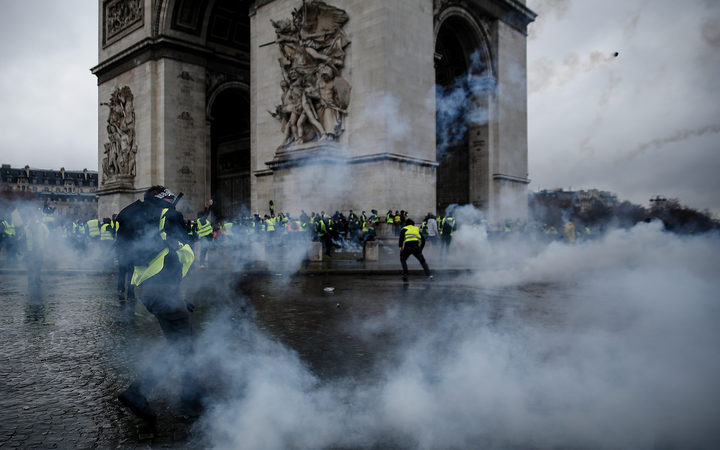It has taken until 1.30 this afternoon (many, many,many hours) for the western presstitutes to respond.
As
it was, it was well-hidden.
The
people at RNZ, if they have an opinion probably don’t like
criticism of France’s very own John Key – bankster president
Macron.
Gilets jaunes protest hits French business, economy
Radio
NZ,
4
December, 2018
Three
weeks of gilets jaunes - "yellow vest" -
protests have hit the French economy hard, with trade in shops,
hotels and restaurants falling significantly, Finance Minister Bruno
Le Maire said on Monday.

Demonstrators clash with riot police at the Arc de Triomphe during a protest of Yellow vests (Gilets jaunes) against rising oil prices and living costs. Photo: AFP
Speaking after a meeting with industry groups and business federations affected by the protest movement, Le Maire said sector revenues had been hit by between 15 and 50 percent.
While
not providing a precise breakdown, Mr Le Maire said small retailers
had seen a fall in revenue of between 20 and 40 percent, and the
hotel industry was seeing reservations down 15 to 25 percent.
Restaurants,
depending on their location, had seen takings collapse by between 20
and 50 percent.
"The
impact is severe and ongoing," Mr Le Maire said, emphasising it
was nationwide, although Paris, after riots and looting in some of
its most upmarket districts on Saturday afternoon and evening, was
particularly affected.
The
movement began on 17 November as a social-media-planned protest
against fuel-tax rises, but has since morphed into an anti-Macron
uprising.
An
80-year-old woman died after being hit in the face by a tear gas
canister fired by police as she was attempting to shutter her
windows.
Three
other people have been killed in the protests since demonstrations
started more than two weeks ago.
The
ministry was not able to say what sort of impact the unrest would
have on gross domestic product, but having hoped for a pick-up in the
fourth quarter on the back of rising consumer spending, that now
appears less likely.
Holiday
season shopping has started poorly, according to industry group
Federation du Commerce et de la Distribution, which expects a slump
in hirings and a transfer of shopping to e-commerce, mainly on
Amazon, a spokeswoman said.
Amazon
was not immediately available to comment but CDiscount, the
e-commerce arm of retailer Casino, attributed the record number of
visits to its websites partly to "demonstrations or blockades
organised outside some shops".
Market
data aggregator Nielsen said on Monday retail sales had contracted
during three days of nationwide protest since 17 November, and had
struggled to recover in between. It said supermarket sales had
plunged 35 percent on day one on 17 November and 18 percent on day
two, 24 November.
Last
week, sales were down six to 13 percent Monday through Wednesday,
picked up slightly on Thursday and Friday, but then fell eight
percent again on the third day of nationwide protests on Saturday, it
said.
During
Saturday's disturbances in Paris, tourists were left shocked, with
some saying they would cut short their visit.
Many sectors affected
When
they started, the "yellow vests" protests were focused on
denouncing a squeeze on household spending brought about by President
Emmanuel Macron's taxes on diesel, which he says are necessary to
combat climate change and protect the environment.
But
for the past two weekends there have also been violent demonstrations
and clashes with security forces in Paris and other major cities,
with protesters calling for Macron to resign. Some call it a
revolution against a president who they see as out of touch with the
concerns of ordinary people.
Saturday's
protests in Paris turned particularly violent, with protesters from
the far-right and far-left mixing with the "yellow vests"
and intent on causing as much damage as possible.
The
Arc de Triomphe was defaced and avenues off Paris's Champs Elysees
were the scene of mass-vandalism.
Shops
on the Champs Elysees and in the heart of Paris, including the Apple
store and Dior and Chanel boutiques, had their windows smashed. Some
others were looted. Prestigious Parisian department stores Printemps
and Galeries Lafayette protectively shut their doors on Saturday
afternoon.
Luxury
groups such as SMCP, Hermes and LVMH, which are heavily dependent on
foreign tourists visiting Paris during the Christmas season are
likely to suffer, said Berenberg analysts in a report.
The
effect may extend through the holiday season.
Hotel
industry group UMIH said some Paris hotels were seeing cancellation
rates of 20 percent to 50 percent and reservations down 10 percent to
15 percent.
"We
have received calls from many worried customers and we have reassured
them," said Carlos Conesa, head concierge at the five-star
Napoleon Hotel. "During the protests, the hotel didn't suffer
any damage and most of our guests decided to stay inside and had
dinner in our restaurants."
While
the violence in downtown Paris stunned the country, waves of protests
have also targeted road infrastructure, with a another potential
impact on the economy.
Vinci
Autoroute, France's largest toll-road operator, has seen dozens of
road blockades and forced openings of barriers since the protests
erupted two weeks ago. Protesters have also damaged infrastructure, a
spokesman said.
French
oil major Total has said 75 of its 2,200 petrol stations have run dry
as "yellow vests" blockade fuel depots.
Car
manufacturer Peugeot SA said production at a plant in eastern France
was disrupted for half a day. It takes almost two weeks to recover
disrupted output, it said.
Mr
Le Maire said both Peugeot and rival Renault had lost vehicle orders.
- Reuters/BBC



No comments:
Post a Comment
Note: only a member of this blog may post a comment.